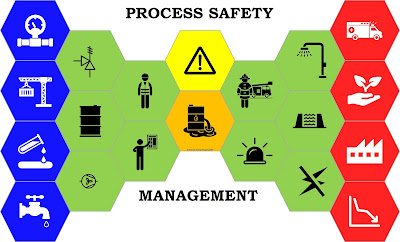The Importance of
Process Safety Management
Part 4 - ADNOC & GULF HSE Interview
"Ensuring Safe and Efficient Operations: The Importance of Process Safety Management"
Process
safety management (PSM) is a critical aspect of industrial operations, aimed at
ensuring the safe and efficient functioning of processes and preventing
incidents that could cause harm to employees, the environment, and the wider
community. The PSM framework helps organizations identify, assess, and manage the
risks associated with their processes, and to implement the necessary measures
to mitigate these risks.
The
importance of PSM cannot be overstated. The consequences of a process safety
incident can be catastrophic, resulting in loss of life, environmental damage,
and economic losses. It is therefore essential that organizations take a
proactive approach to process safety and implement robust PSM systems.
To effectively manage process safety, organizations must:
Identify
Hazards: The first step in PSM is to identify the hazards associated with
processes and to assess their potential consequences. This involves reviewing
process designs, conducting process hazard analyses, and assessing the impact
of any changes to processes.
Implement
Controls: Organizations must implement effective controls to mitigate the risks
associated with their processes, including process and equipment design,
operator training, and emergency response planning.
Monitor
and Review: PSM systems must be continuously monitored and reviewed to ensure
that they remain effective and to identify and address any emerging risks. This
may involve regular inspections, safety audits, and incident investigations.
Encourage
Employee Involvement: Employees must be encouraged to take an active role in
PSM, from reporting potential hazards to participating in continuous
improvement efforts.
Comply
with Regulations: Organizations must comply with relevant regulations and
standards, including OSHA's PSM standard and relevant environmental
regulations.
The
benefits of PSM extend beyond incident prevention and regulatory compliance.
Effective PSM can also lead to improved operational efficiency, reduced costs,
and increased employee engagement and morale. By prioritizing process safety
and implementing robust PSM systems, organizations can create a safer and more
sustainable workplace for all.
In
conclusion, PSM is a critical aspect of industrial operations, aimed at
ensuring the safe and efficient functioning of processes and preventing
incidents that could cause harm to employees, the environment, and the wider
community. Strong leadership, effective risk management, and employee
involvement are essential components of a successful PSM program, and
organizations must continuously monitor and improve their PSM systems to ensure
that they remain effective and relevant. By prioritizing process safety, organizations
can create a safer and more sustainable workplace for all.
Process
Safety Management, Industrial Operations, Risk Management, Incident Prevention,
Regulatory Compliance, Employee Safety, Environmental Protection.





No comments:
Post a Comment